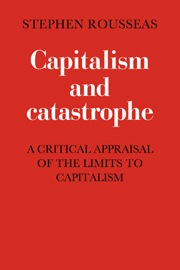5 - Beyond advanced unplanned capitalism
Published online by Cambridge University Press: 05 November 2011
Summary
There shall be wailing in every street,
and in all open places cries of woe …
there shall be lamentation in every vineyard …
The day of the Lord is indeed darkness, not light,
a day of gloom with no dawn.
– AmosThe constant refrain of Marxian and neo-Marxian analysis is that capital accumulation and growth are essential for the survival of capitalism. It was on this issue that the great debate broke out between Rosa Luxemburg and her critics. Growth was seen to be based not only on capital accumulation but also on technological change, which now serves as the major productive force of capitalism. If for any reason growth should not be possible, then capitalism would be faced with a deadly challenge leading ultimately to its destruction – or so it would seem on the basis of Marxian theory.
We should, however, step back and look at an earlier time when mercantilists were convinced that universal growth was an impossibility and acted accordingly. The strife and struggles of that time are relevant for the world of today, which is now entering its own phase of mercantilist power politics.
The earlier mercantilism of the seventeenth and eighteenth centuries emerged, out of the economic chaos of feudalism, as the builder of the great nation-states. Its greatest development came in France under Louis XIV (1638–1715) and his brilliant finance minister, Jean-Baptiste Colbert (1619–83). Mercantilists were acute observers of the world they lived in.
- Type
- Chapter
- Information
- Capitalism and Catastrophe , pp. 71 - 97Publisher: Cambridge University PressPrint publication year: 1979



